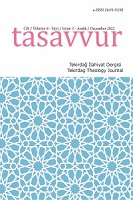Memlükler Döneminde Kudüs’te Niyâbetin ve Dört Kâdılkudâtlığın Kuruluşu
The Formation of Niyāba and Four Chiefjudgeships in Mamluk Jerusalem
Author(s): Muhammet Enes MİDİLLİSubject(s): Historical Geography, History of Law, Diplomatic history, Political history, Philosophy of Law
Published by: Tekirdağ Namık Kemal Üniversitesi İlahiyat Fakültesi
Keywords: Jerusalem; niyāba; chiefjudgship; Mamluks; Cairo;
Summary/Abstract: This article deals with the elevation of the administrative status of Jerusalem from vilāya to niyāba and the impact of this transformation on the judicial organization and the appointments in the city. During the early Mamluk period, Jerusalem remained as wilāya, a less significant administrative unit, subordinate to the nā’ib of Damascus. However, in the later eighth/fourteenth century, the city was turned into a separate niyāba, an administrative unit governed by the viceroy (nā’ib al-saltana) of the sultan, and attached directly to Cairo, the political centre of the Mamluks. While the existing scholarship tends to see this change as a manoeuvre against the Crusader threat, this article argues that the foundation of niyāba in Jerusalem was associated with the bureaucratic centralisation of the Mamluk Sultanate and the religious importance of the city. Unlike the Ayyubid politics of fragmented sovereignty between the dynasty members, the Mamluks appointed viceroys on behalf of the sultan to the significant cities of Syria. Therefore, the foundation of niyāba in Jerusalem can be seen as a continuation of this attempt toward the centralisation of the Syro-Egyptian lands. On the other hand, with this change, the Mamluk sultan had the opportunity to express his patronage over Jerusalem in a more powerful way and to control the administrative, judicial, and scholarly realms in the city directly. What is more important in terms of the judicial practices is that Jerusalem was introduced to four chief judgeships (Shāfi‘ī, Hanafī, Mālikī, and Hanbalī) within the thirty-year period after the foundation of niyāba. All these changes meant that the city became bureaucratically more integrated with Cairo so that the Cairene elite were increasingly involved in local appointments of scholars. Moreover, it became increasingly crucial for Jerusalemite scholars to have connections with Cairene bureaucrats in order to secure scholarly positions in Jerusalem.
Journal: Tasavvur Tekirdağ İlahiyat Dergisi
- Issue Year: 8/2022
- Issue No: 2
- Page Range: 1301-1327
- Page Count: 27
- Language: Turkish

